b. April 1st, 1906 in Big Stone Gap (Virginia)
d. May 10th, 1979 in Pontiac (Michigan)
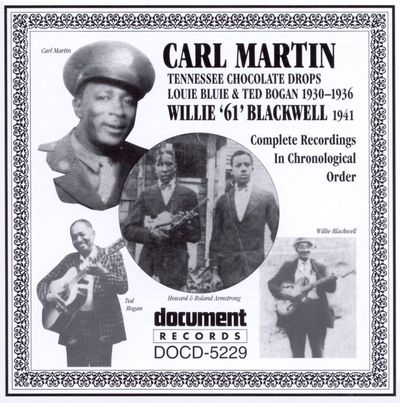
COMPLETE RECORDED WORKS
Document
April 1930 - April 1936
Multi-instrumentiste (essentiellement guitariste et mandoliniste), il nait dans une famille de treize frères et soeurs. Son père Frank Martin était lui-même bluesman. La famille habite à Knoxville (Tennessee) dès 1918. Carl apprend d'abord la guitare grâce à son père et à son demi-frère Roland Martin. Il forme les Tennessee Chocolate Drops avec Howard & Roland Armstrong (respectivement violoniste et guitariste), un string-band avec lequel il grave deux titres en avril 1930. Avec l'arrivée de Ted Bogan et William Ballenger - et la défection de Roland Armstrong - ils deviennent les Four Keys. Au milieu des années 30, Carl est à Chicago et accompagne "Bumble Bee" Slim, Tampa Red, Washboard Sam et Freddie Spruell. Découvert par Lester Melrose, il grave ses premiers et excellents morceaux pour Bluebird ("You can go your way", "Crow Jane", "Old time blues") où il montre une belle habileté à la guitare. Il enregistrera aussi pour Vocalion ("You can't play me cheap", "Good morning Judge"), Decca et Champion. Au début des années 40, il est enrolé dans l'armée aux Philippines (il est démobilisé en 1945).
Multi-instrumentalist (mainly guitarist and mandolinist), he is born in a family of thirteen siblings. His father Frank Martin was himself a bluesman. The family lived in Knoxville (Tennessee) from 1918. Carl first learned guitar through his father and half-brother Roland Martin. He forms the Tennessee Chocolate Drops with Howard & Roland Armstrong (violinist and guitarist), a string-band with whom he cut two tracks in april 1930. With the arrival of Ted Bogan and William Ballenger - and the defection of Roland Armstrong - they became the Four Keys. In the mid-30's, Carl was in Chicago and accompanied "Bumble Bee" Slim, Tampa Red, Washboard Sam and Freddie Spruell. Spotted by Lester Melrose he records his first and best songs for Bluebird ("You can go your way", "Crow Jane", "Old time blues"), where he shows a great skill on guitar. He will also record for Vocalion ("You can't play me cheap", "Good morning Judge"), Decca and Champion. In the early 1940's, he was enlisted in the army in the Philippines (he was demobilized in 1945).
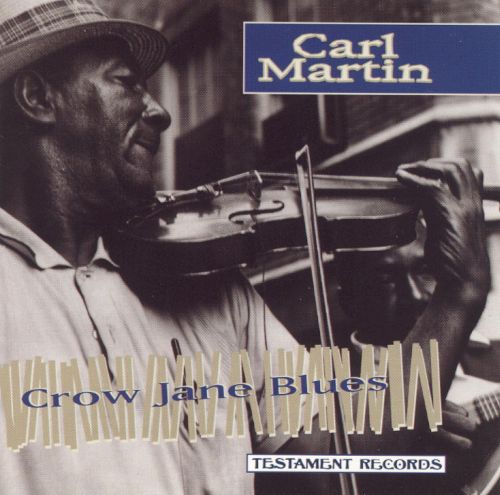
CROW JANE BLUES
Testament
May 1966
Redécouvert en 1966 par Pete Welding grâce à l'aide de Johnny Young, Carl (guitare, mandoline, violon) est accompagné par John Lee Granderson et Johnny Young dans le style des string-bands des années 30. "Crow Jane blues", "State Street pimp", "Gravedigger blues", "Good morning Judge", "Railroad blues" sont superbement rendus. D'ailleurs, l'ensemble du programme mérite vraiment l'écoute. Ce CD n'a malheureusement été publié qu'en 1997.
Rediscovered in 1966 by Pete Welding with the help of Johnny Young, Carl (guitar, mandolin, violin) is accompanied by John Lee Granderson and Johnny Young in the style of string-bands of the thirties. "Crow Jane blues", "State Street pimp", "Gravedigger blues", "Good morning Judge", "Railroad blues" are superbly rendered. In fact, the whole program really deserves listening. Unfortunately, this CD was published only in 1997.
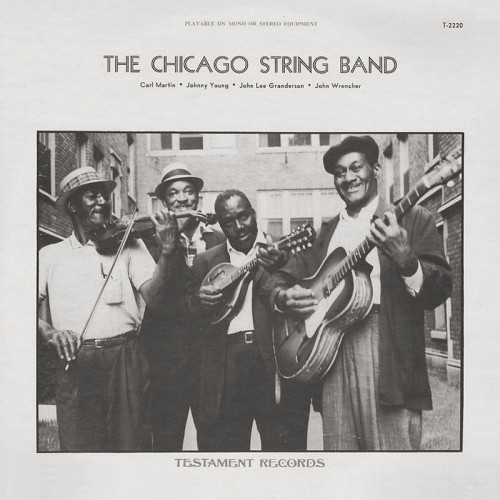
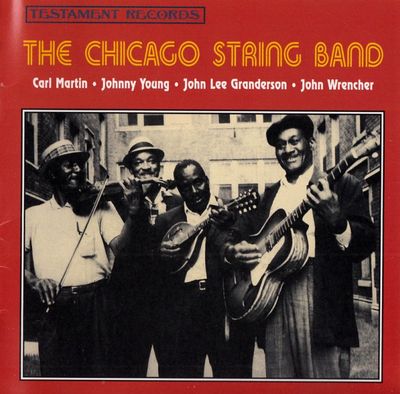
CHICAGO STRING BAND
Testament
June 1966
Quelques jours après les séances de "Crow Jane blues", Pete Welding réunit Carl Martin (violon, mandoline), John Lee Granderson (guitare), "Big" John Wrencher (harmonica) et Johnny Young (mandoline). Les quatre hommes chantent alternativement. Le but est de reproduire fidèlement le son des string-bands des années 20 & 30. Agréable et varié, cet album possède de nombreux bons moments : "Don't sit your dog on me", "The sun is sinking low", "Weeping and moaning", "Hoodoo blues", "You got good business". Un disque qui mériterait d'être redécouvert.
A few days after the "Crow Jane blues" sessions, Pete Welding brings together Carl Martin (violin, mandolin), John Lee Granderson (guitar), "Big" John Wrencher (harmonica) and Johnny Young (mandolin). The four men sing alternately. The goal is to reproduce faithfully the sound of the string-bands of the 20's & 30. Pleasant and varied, this album has many good moments : "Don't sit your dog on me", "The sun is sinking low", "Weeping and moaning", "Hoodoo blues", "You got good business". A record that deserves to be rediscovered.
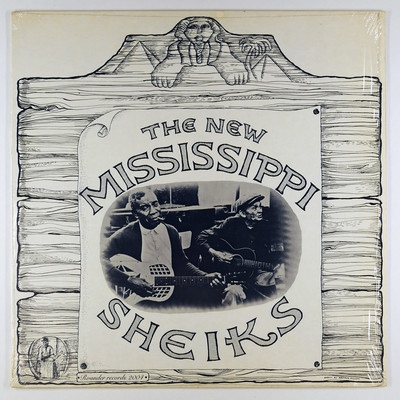
THE NEW MISSISSIPPI SHEIKS
Rounder
February 1972
Les guitaristes Sam Chatmon et Walter Vinson sont associés à Carl Martin (mandoline, violon) et Ted Bogan (basse) pour faire revivre le plus célèbre des string-bands. Les quatre musiciens s'étaient réunis pour jouer au festival Folk de l'université de Chicago en janvier 1972. Le mois suivant, ils réalisent ensemble ce microsillon pour le label Rounder. La musique traditionnelle jouée ici s'avère plutôt plaisante quoiqu'un peu monotone par moments. Ce microsillon n'a jamais été réédité en CD.
Guitarists Sam Chatmon and Walter Vinson are partnered with Carl Martin (mandolin, violin) and Ted Bogan (bass) to revive the most famous string-band. The four musicians were gathered to play at the Folk Festival of the University of Chicago in january 1972. The following month, they play all on this LP for the label Rounder. The traditional music played here is rather pleasant though somewhat monotonous at times. This LP has never been reissued on CD.
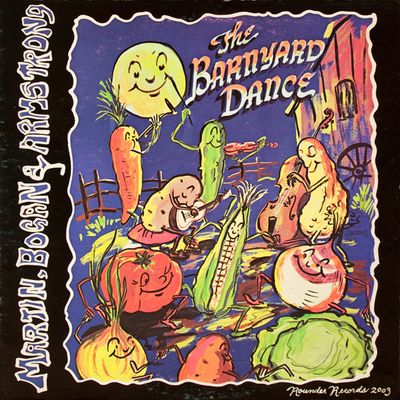
BARNYARD DANCE
Rounder
March 1972
Premier LP pour le trio Martin, Bogan & Armstrong supervisé par Bruce Kaplan : Carl Martin (mandoline), Ted Bogan (guitare), Howard Armstrong (violon et auteur de la peinture illustrant la pochette) et une petite aide de L.C. Armstrong (basse), le frère d'Howard. Un programme Folk-Blues parfois inégal mais globalement intéressant ("Carl's blues", "Mean mistreatin' mama", "Old man mose").
First LP for the Martin, Bogan & Armstrong trio supervised by Bruce Kaplan : Carl Martin (mandolin), Ted Bogan (guitar), Howard Armstrong (violin and author of the painting illustrating the cover sleeve) and a little help from L.C. Armstrong (bass), Howard's brother. A Folk-Blues program sometimes uneven but globally interesting ("Carl's blues", "Mean mistreatin' mama", "Old man mose").
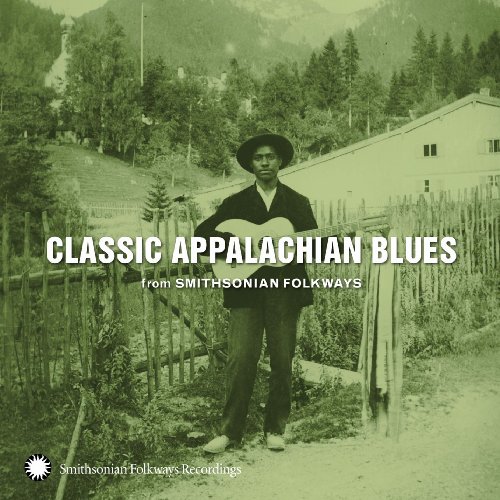
CLASSIC APPALACHIAN BLUES
Smithsonian - Folkways
July 1972
Un titre inédit (une excellente version de "Hoodoo blues") capté lors du Smithsonian Festival of American Folklife à Washington en juillet 1972.
One unissued title (an excellent version of "Hoodoo blues") captured at the Smithsonian Festival of American Folklife in Washington in july 1972.
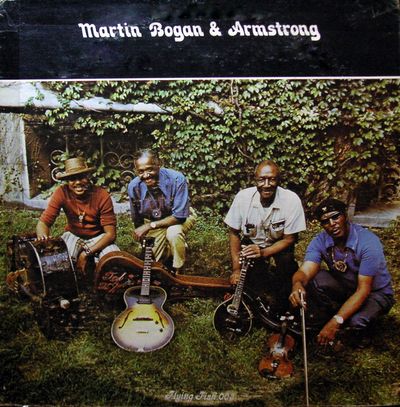
MARTIN, BOGAN & ARMSTRONG
Flying Fish
Sonet
1974
Second album pour le trio de vétérans bluesmen Martin, Bogan & Armstrong (en fait ils sont quatre puisque Tom Armstrong - fils d'Howard Armstrong - a rejoint le groupe) produit par Bruce Kaplan. Dans la tradition des string-bands - très inspirés et très en verve - ils livrent un opus rafraichissant et agréable entre Blues et Folk avec quelques incursions Jazz et Country. Il faut écouter les superbes "Do you call that a buddy", "If you'se a viper", "They cut down the old pine tree", "You'll never find another kanaka like me".
Second album for the trio of veterans bluesmen Martin, Bogan & Armstrong (in fact they are four since Tom Armstrong - son of Howard Armstrong - joined the band) produced by Bruce Kaplan. In the tradition of string-bands - very inspired and in verve - they deliver a refreshing and pleasant opus between Blues and Folk with some Jazz and Country incursions. You have to listen to the superb "Do you call that a buddy", "If you'se a viper", "They cut down the old pine tree", "You'll never find another kanaka like me".
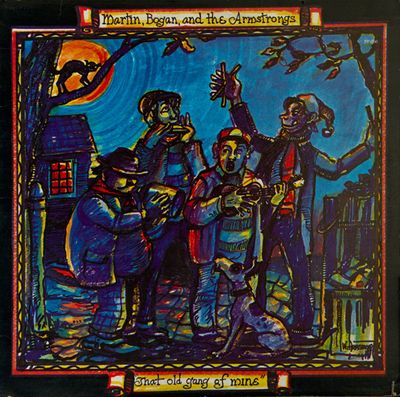
THAT OLD GANG OF MINE
Flying Fish
January 1975 - Fall 1977